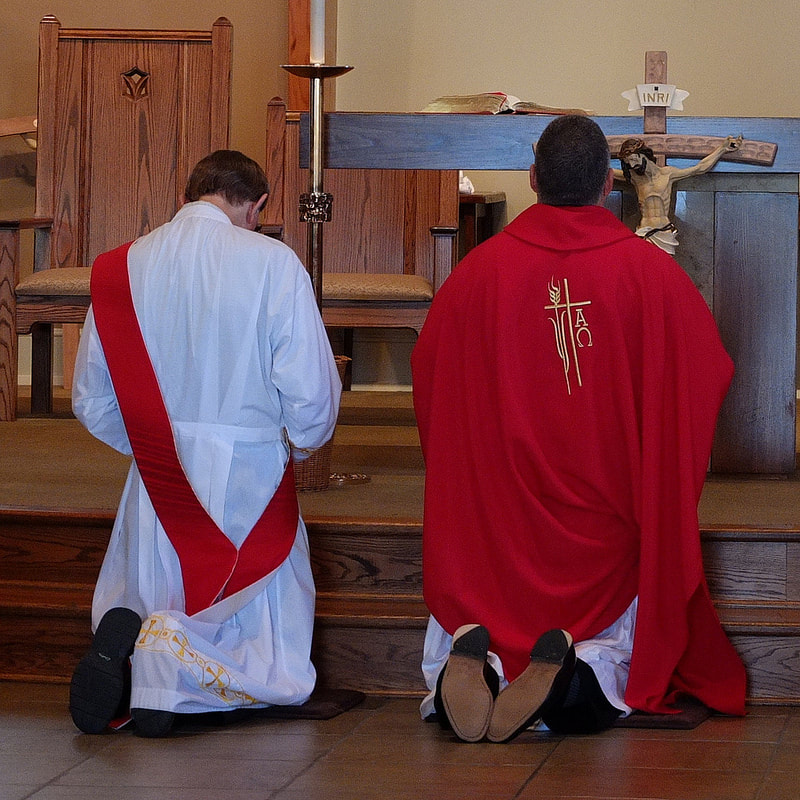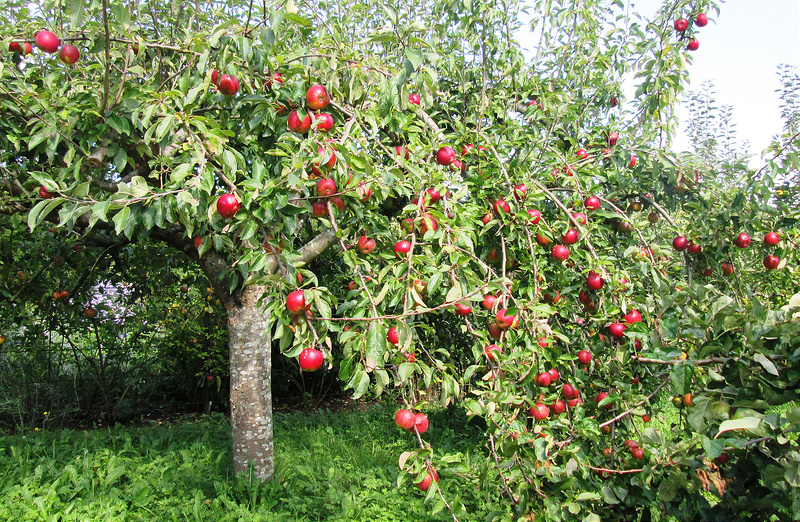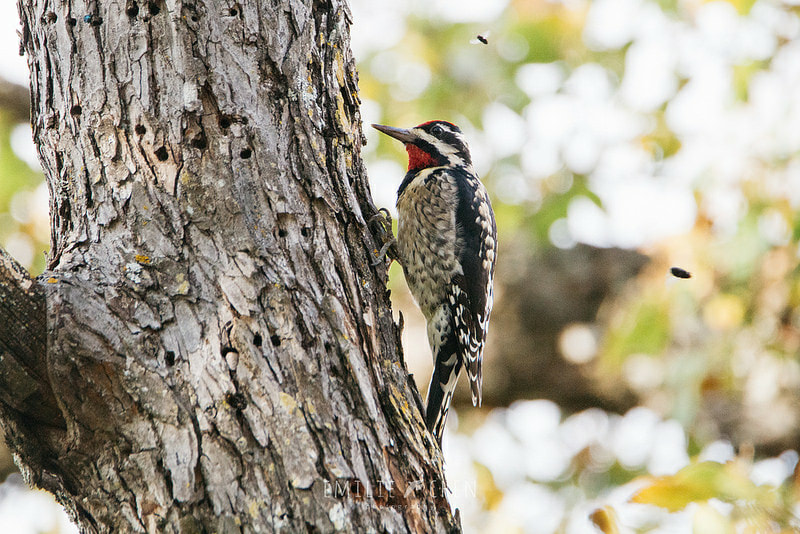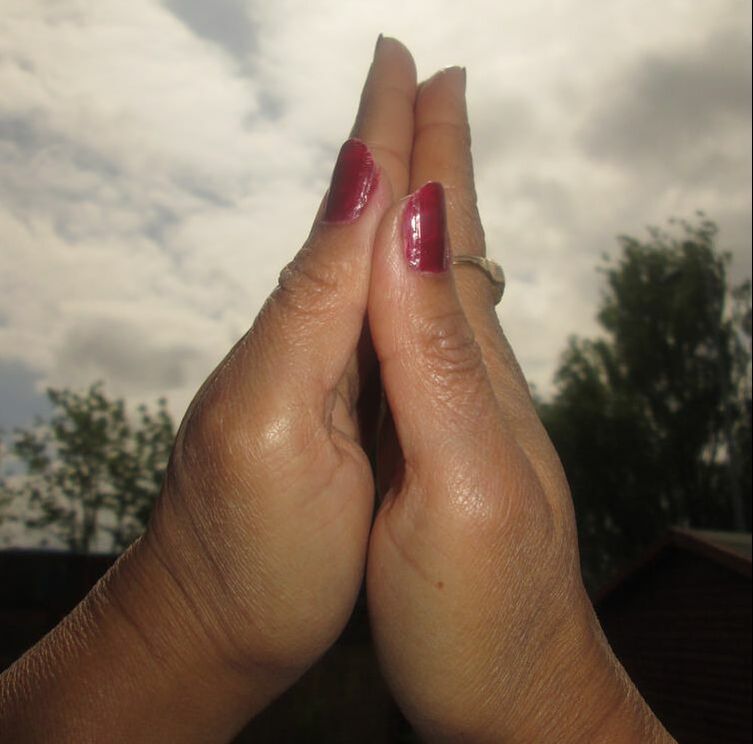|
Here are the words of Paul from Philippians 2:5-11: "Your attitude should be the same as that of Christ Jesus: Who, being in very nature God, did not consider equality with God something to be grasped, but made Himself nothing, taking the very nature of a servant, being made in human likeness. And being found in appearance as a man, He humbled Himself and became obedient to death--even death on a Cross! Therefore, God exalted Him to the highest place and gave Him the name that is above every name, that at the name of Jesus every knee should bow, in heaven and on earth and under the earth and every tongue confess that Jesus Christ is Lord, to the glory of God the Father."
Jesus is the master of humility. Consider what He did for us as described by Paul. For Him to give us the blessings of salvation, redemption and eternal life He had to humble Himself by leaving His throne, being born of the flesh and submitting to cruel abuse, judgment, crucifixion and death, even though He had the power to stop it all. What humility and love! The Book of Mysteries, by Jonathan Cahn, talks about the posture of humility—kneeling. Several Scriptures describe situations where the people of Israel knelt before the Lord. At the dedication of the temple built by Solomon, the glory of the Lord filled the temple. "When all the Israelites saw the fire coming down and the glory of the Lord above the temple, they knelt on the pavement with their faces to the ground, and they worshiped and gave thanks to the Lord..." (2 Chronicles 7:3) Individuals who approached Jesus to ask His help for themselves or their loved ones knelt before Him. "...A ruler came and knelt before Him and said, 'My daughter has just died. But come and put your hand on her, and she will live.'" (Matthew 9:18) A Canaanite woman came to Jesus on behalf of her demon-possessed daughter. "The woman came and knelt before Him. 'Lord, help me!’ she said." (Matthew 15:25) Jesus Himself knelt down to pray to His Father in heaven while in the garden when He contemplated His crucifixion that was required for our blessing. (Luke 22:41) The Psalmist encourages us to take the posture of humility. "Come, let us bow down in worship, let us kneel before the Lord, our Maker." (Psalm 95:6) Kneeling is a posture of humility and a way to worship the Lord. Jonathan Cahn points out that the Hebrew word "barach" has two meanings: bless and kneel. One must lower themselves in order to kneel. The Lord lowered Himself from heaven to earth and on earth to bring us blessings. As Paul says in Ephesians 1:3-4, "Praise be to the God and Father of our Lord Jesus Christ, who has blessed us in the heavenly realms with every spiritual blessing in Christ. For He chose us in Him before the creation of the world to be holy and blameless in His sight." How blessed we are! We should be on our knees, in humility before the Lord, thanking Him for every blessing. Arbor Day in the United States and Australia, New Year of the Trees in Israel, National Tree Day in South Africa--Several nations celebrate a day set aside to acknowledge the blessings of the trees. There are many! Trees produce fruit and nuts, give lumber for construction, take in carbon dioxide and give off oxygen, are beautiful to look at, and the tree's leaves provide shade and the roots help stabilize the soil. In the United States we celebrate Arbor Day on the last Friday in April. The holiday celebrates the role of trees in our lives and began in Nebraska in 1872 at the request of J. Sterling Morton. He suggested a day set apart for public tree planting. He commented about the purpose of the day. "Arbor Day is not like other holidays. Each of those reposes on the past, while Arbor Day proposes for the future."
Every year the nation of Israel sets aside the 15th day of the month of Shevat (Tu Bi Sh'vat) as the "New Year of the Trees." In Hebrew this would be Rosh Hashanah La'llanot. On our 2019 calendar, this day begins at sunset on January 20 and ends at sunset on January 21. The three main activities and purposes of this day are as follows: 1. Jews often eat some of the fruit of the seven species that are associated with the Holy Land. They are listed in Deuteronomy 8:8. "...a land with wheat, barley, vines (grapes) and fig trees, pomegranates, olive oil and honey (dates)." Eating these fruits reminds them that God has provided for them and of their connection with the earth. They play a role as caretakers of the environment. 2. This is a day to plant trees. Doing this brings benefits for the present and the future. This ecological holiday is a reminder to the tree planters that they are providing for themselves and the generations to come. 3. The 15th day of Shevat is the cut-off date for calculating the age of fruit-bearing trees. God gave instructions to the Israelites about how to live when they entered the Holy Land. "When you enter the land and plant any kind of fruit tree, regard its fruit as forbidden. For three years you are to consider it forbidden; it must not be eaten. In the fourth year all its fruit will be holy, an offering of praise to the Lord. But in the fifth year you may eat its fruit. In this way your harvest will be increased. I am the Lord your God." (Leviticus 19:23-25) For the first three years, the fruit on the trees is called Orlah or "uncircumcised fruit." The requirement is for each year's tree crop to be tithed separately. With everyone using the "New Year of the Trees" to determine the age of the tree, there is understanding on how to tithe and consistency in counting the age of a tree. Before the fruit of a tree can be eaten, a blessing is said giving God the glory for producing the crop: "Baruch Atah Adod-nai Elohai-nu Melech Ha Olam boray pri ha-aitz." or "Blessed are You, God, King of the Universe, who creates the fruit of the tree." Rabbinical teaching often compares God's people to trees. We would do well to pay attention to the Scriptures that give us guidance on how to live like a fruitful tree. We must be like a tree rooted and grounded in the Lord in order to grow and produce good fruit. "Just as you received Christ Jesus as Lord, continue to live in Him, rooted and built up in Him. strengthened in the faith as you were taught, and overflowing with thankfulness." (Colossians 2:6-7) Like a tree, we will go through different seasons in our lives and must be flexible and resilient to go through them but still yield fruit for the Kingdom. "There is a time for everything, and a season for every activity under heaven." (Ecclesiastes 3:1) Jeremiah 17:7-8 says, "But blessed is the man who trusts in the Lord, whose confidence is in Him. He will be like a tree planted by the water that sends out its roots by the stream. It does not fear when heat comes; its leaves are always green. It has no worries in a year of drought and never fails to bear fruit." The Psalmist paints a similar picture, saying that as we delight in the law of the Lord and meditate on it day and night we will be "like a tree planted by streams of water, which yields its fruit in season and whose leaf does not wither. Whatever we do prospers." (Psalm 1:2-3) An interesting visitor comes to our Maple tree on a regular basis. His colorful feathers stand out in the drab winter landscape. His head and throat are bright red and are surrounded by black and white stripes. His back is a mottled black with markings of white. He gets his name, yellow-bellied sapsucker, from his dull yellowish belly. The sad part about our visitor is that he comes to drill holes in our tree. Over the years he has weakened the tree, and we see branches slowly dying from the impact of his feeding habits. He bores 1/8" holes into the cambium layer or inner bark of the tree, causing the sap to ooze out. With his long, brush-tipped tongue he laps up the sap. It is common for these birds to drill several holes in a perfect row around the trunk. Too much of this will kill the tree. The holes provide entry points for insects or diseases which also contribute to the weakening of the tree.
Once the yellow-bellied sapsucker discovers a good feeding spot, he returns to it again and again. In order to discourage these birds, one must wrap the tree trunk and larger branches with burlap, particularly where the first holes are drilled. This keeps the bird from reaching the sap in the tree. It is critical to stop the path of destruction before it goes too far. We have an enemy who would like to destroy us. He comes to "drill holes" in our minds. He wants to destroy our clarity of thought. Frequently he comes as a whisperer to whisper an idea or bad thought into our minds. If he finds "fertile ground" he will return with more lies. It is interesting to note that the Hebrew word for serpent is Nahash, which literally means whisperer. King Solomon, known for his wisdom, made an interesting observation in Proverbs 16:28. "A whisperer separates close friends." (ESV) The serpent first appeared on the scene when he whispered into Eve's ear. He put thoughts that are counter to God's truth into her head. Once these thoughts prevailed, she sinned by eating the fruit from the forbidden tree and giving her husband some of it. Consequently, Adam and Eve died a spiritual death and became separated from God. Just as burlap protects the bark of a tree from the yellow-bellied sapsucker, the Word of God protects our minds from our enemy--the one who whispers lies. We must not allow him to continue his litany of lies. Every whisper that turns into a thought must be taken captive so that it is obedient to Christ. (2 Corinthians 10:5) Both King David, in Psalms, and King Solomon, in Proverbs, write that "Every word of God is flawless; He is a shield to those who take refuge in Him." (Psalm 18:30/Proverbs 30:5) Indeed, not only is God a shield, but He is our Redeemer. God sent His Son Jesus as a "second Adam" to restore and redeem us from the curse of the enemy. He came as the Living Word to bring light and life to us. John 1:12 tells us, "To all who received Him, to those who believed in His name, He gave the right to become children of God." Victory over the enemy is ours as we shut down the whispered lies by declaring the truth of our God and Savior. Sundown begins the 11th month on the Hebrew calendar, Shevat, known as the month of righteousness. The Hebrew letter associated with this month is TZADIK which symbolizes the "righteous one." Jeremiah the prophet declared the hope of God to his people: "'The days are coming,' declares the Lord, 'when I will raise up to David a righteous Branch, a King who will reign wisely and do what is just and right in the land. In His days Judah will be saved and Israel will live in safety. This is the name by which He will be called: The Lord Our Righteousness." (Jeremiah 23:5-6)
Our goal must be to become like God—righteous. This means being in right standing with God. We are encouraged to pursue this goal through a promise in Matthew 5:6. "Blessed are those who hunger and thirst for righteousness, for they will be filled." Here we must ask ourselves a question. How hungry and thirsty are we? It is through faith in Jesus that we attain righteousness. (Romans 3:22) Not only this, but the apostle Paul tells us, "You have been set free from sin and have become slaves to righteousness.” (Romans 6:18) Paul goes on to encourage us: “...So now offer yourselves as slaves to righteousness leading to holiness." (Romans 6:19) Scriptures call several people in the Bible righteous. I would like to focus on one—Simeon. His name means one who hears and obeys. He was told that God would send the Messiah to Israel, and that he would see Him before he died. Here is how it is described in Luke 2:25-30. "Now there was a man in Jerusalem called Simeon, who was righteous and devout. He was waiting for the consolation of Israel, and the Holy Spirit was upon him. It has been revealed to him by the Holy Spirit that he would not die before he had seen the Lord's Christ. Moved by the Spirit, he went into the temple courts. When the parents brought in the child Jesus to do to Him what the custom of the Law required, Simeon took Him in his arms and praised God, saying: 'Sovereign Lord, as you have promised, you now dismiss your servant in peace. For my eyes have seen Your salvation.'" Simeon never doubted that he would see Jesus. Even in old age he stayed connected to the Holy Spirit and pursued His promise. He is a picture of one who kept on seeking the promise. Both Matthew and Luke wrote the words of Jesus: "Seek and you will find." The proper translation for this is "Keep on seeking." Righteous Simeon, who never stopped seeking, was rewarded by not only seeing the Lord, but holding Him! What promises have you received from the Lord? This is the time to stir up your faith and grow in righteousness. Simeon never stopped seeking after his promise. May we be like Simeon and keep seeking the Lord and the fulfillment of our promises. Be assured that those promises will be realized in God's timing. |
Joan E. MathiasCategories
All
Archives
July 2024
|




 RSS Feed
RSS Feed